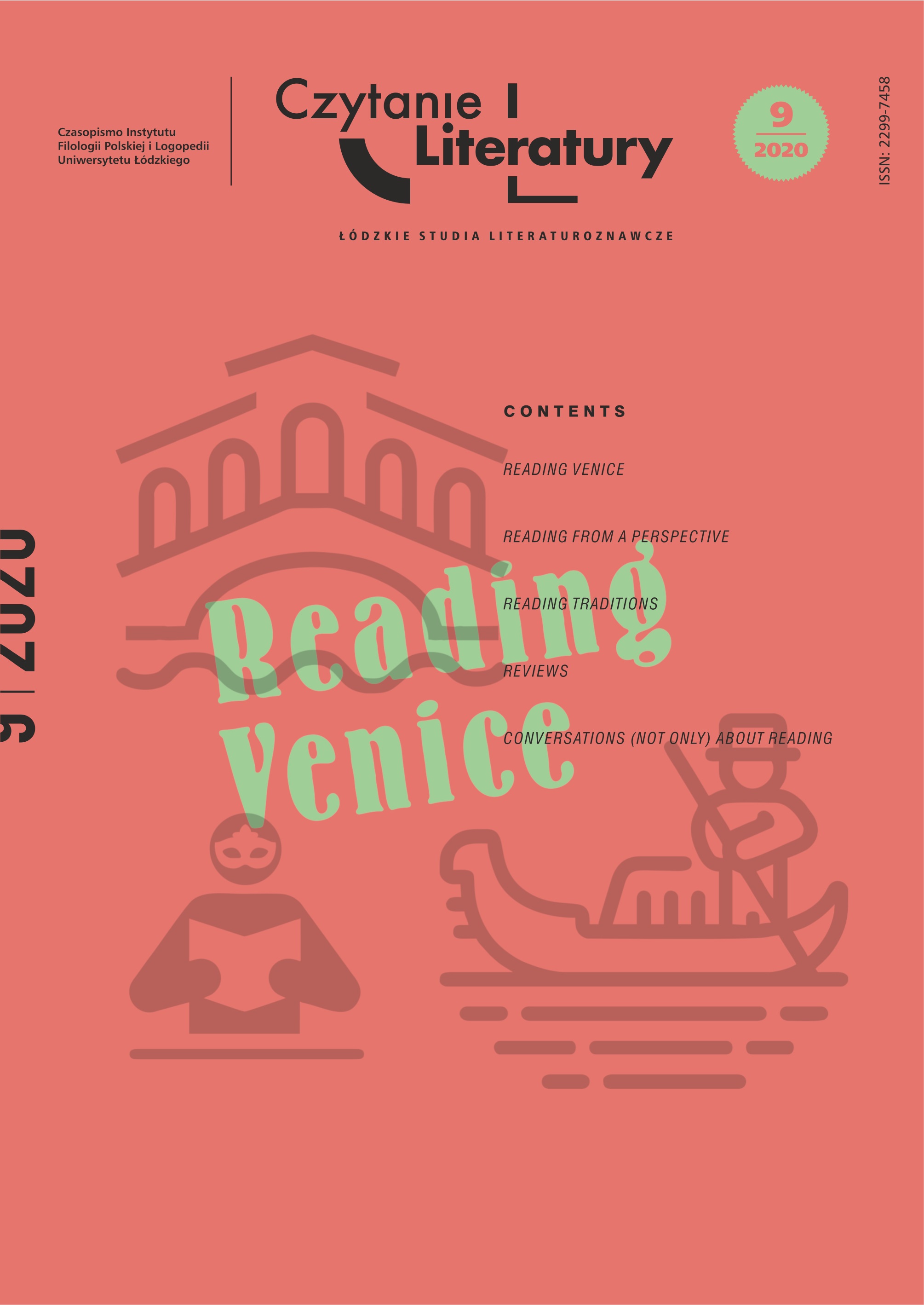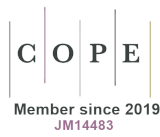All the Faces of Grochowiak
(J. Łukasiewicz, "Poeta Grochowiak" Wrocław: Warstwy, 2019)
DOI:
https://doi.org/10.18778/2299-7458.09.17Słowa kluczowe:
Grochowiak, poetry, miserabilism, war, inter-species communityAbstrakt
The hereby reviewed book by Jacek Łukasiewicz entitled Poeta Grochowiak has been an impressive and monumental undertaking, yet it fulfils only some of the promises made by its author. According to the reviewer, the fact of its release offers grounds for a discussion of the status of theory and the validity of abandoning it in favour of a reading devoid of methodological regime which elevates the importance of pleasure. The main problem which emerges after reading Łukasiewicz’s opus magnum is the issue of selecting the recipient of the monograph (a regular person or a specialist), which in turn conditions the mode of study of the poet’s output. Łukasiewicz’s monograph amplifies the conviction that Grochowiak’s poetic works should be read using new methodologies, which could indicate the poet’s innovation in terms of increasing the value of objects and animals as the most important components of his universe. According to the reviewer, what requires justification the most is the need to comment on nearly all poems from the poet’s released collections, which is supposed to be facilitated by the researcher’s identification of several categories around which his narration centred. The book was divided into two parts. The first part is predominantly chronological, while the second part follows a contextual organisation, which considering the book’s size causes problems in the form of repeated discussions of several poems. The reviewer noted the fact that some were subjected to careful reading several times while other, especially those not released, did not receive a sufficient amount of attention. Additionally, Łukasiewicz did not attempt to define the gravity of the topic of the most recent world war in Grochowiak’s output or to reconstruct the poet’s polemic with Julian Przyboś during the mature stage of the former’s creative life. An in-depth analysis is also demanded for poems discussing the suffering of animals and inter-species community, which Łukasiewicz deemed noteworthy yet his comments to those do not help readers find indications of eco-critical awareness in Grochowiak’s works. The new monograph devoted to the output of the author of Kanon sheds new light on many problems and biographical contexts as the critic knew the poet, yet some issues require further study. Poeta Grochowiak as the crowning of Łukasiewicz’s efforts into the study of the poet’s output is impressive, yet there is no doubt that a panoramic view does not guarantee noticing every detail, and it is in details that Grochowiak’s poetic sensitivity is lodged.
Pobrania
Bibliografia
Balcerzan, Edward. “Przygoda trzecia: apokryfy niemieckie.” In Edward Balcerzan, Przygody człowieka książkowego (ogólne i szczególne). Warsaw: PEN Publishing House, 1990, 32–50.
Google Scholar
Baratay, Éric. Zwierzęta w okopach. Zapomniane historie. Trans. Barbara Brzezicka. Gdańsk: Publishing House in the Courtyard, 2017.
Google Scholar
Błoński, Jan. “Fetyszysta brzydoty.” In Jan Błoński, Zmiana warty. Warsaw: State Publishing Institute, 1961, 73–83.
Google Scholar
Buryła, Sławomir. Rozrachunki z wojną. Warsaw: The Institute of Literary Research of the Polish Academy of Sciences, 2017.
Google Scholar
Burzyńska, Anna Róża. Małe dramaty. Teatralność liryki Stanisława Grochowiaka. Krakow: Academic Bookshop, 2012.
Google Scholar
Burzyńska, Anna Róża. Maska twarzy. Twórczość dramatyczna Stanisława Grochowiaka. Krakow: Academic Bookshop, 2011.
Google Scholar
Czapliński, Przemysław. “Śmierć, albo o znikaniu – Stanisław Grochowiak.” In Przemysław Czapliński, Mikrologi ze śmiercią. Motywy tanatyczne we współczesnej literaturze polskiej. Poznań: Poznań Polish Studies, 2001, 33–69.
Google Scholar
Grochowiak, Stanisław. Agresty. Warsaw: Czytelnik Publishing House, 1963.
Google Scholar
Grochowiak, Stanisław. Kanon. Warsaw: State Publishing Institute, 1965.
Google Scholar
Grochowiak, Stanisław. Menuet z pogrzebaczem. Krakow: Literary Publishing House, 1958.
Google Scholar
Grochowiak, Stanisław. Nie było lata. Warsaw, 1969.
Google Scholar
Grochowiak, Stanisław. Prozy. Selected and edited by Jacek Łukasiewicz. Warsaw: Atena Publishing House, 1996.
Google Scholar
Grochowiak, Stanisław. “Turpizm – realizm – mistycyzm.” In Debiuty poetyckie 1944–1960. Wiersze, autointerpretacje, opinie krytyczne, edited by Jacek Kajtoch, Jerzy Skórnicki, 366–372. Warsaw: Iskry Publishing House, 1972.
Google Scholar
Grochowiak, Stanisław. Wiersze nieznane i rozproszone. Selected, introduction and commentary by Jacek Łukasiewicz. Wrocław: Society of the Friends of Polish Studies in Wrocław, 1996.
Google Scholar
Grochowiak, Stanisław. Wiersze zebrane. Vol. 1–2. Selected, developed, and edited Beata Symber, introduction by Jacek Łukasiewicz. Wrocław: Warstwy Publishing House, 2017.
Google Scholar
Grochowiak, Stanisław. Wybór poezji. Edited by Jacek Łukasiewicz. Wrocław–Warsaw–Krakow: Ossoliński National Institute, 2000.
Google Scholar
Jarzyna, Anita. Post-koiné. Studia o nieantropocentrycznych językach (poetyckich). Łódź: The University of Lodz Press, 2019.
Google Scholar
DOI: https://doi.org/10.18778/8142-426-4
Kaleta-Łuczynowicz, Patrycja. Metapoezja. O świadomości twórczej Stanisława Grochowiaka. [Doctoral dissertation defended in 2016], https://rebus.us.edu.pl/bitstream/20.500.12128/697/1/Kaleta_Luczynowicz_Metapoezja.pdf
Google Scholar
Kisiel, Marian. “Ciemność i blask. O Modlitwie Stanisława Grochowiaka.” In Marian Kisiel, Między wierszami. Jedenaście miniatur krytycznych. Katowice: The University of Silesia Press, 2015.
Google Scholar
Kwiatkowski, Jerzy. “Ciemne wiersze Grochowiaka.” In Jerzy Kwiatkowski, Magia poezji (O poetach polskich XX wieku). Selected by Maria Podraza-Kwiatkowska and Anna Łebkowska, afterword by Marian Stala. Krakow: Literary Publishing House, 1995, 216–240.
Google Scholar
Łukasiewicz, Jacek. “Allende – czyli o umieraniu.” In Jacek Łukasiewicz, Oko poematu. Wrocław: Lower Silesian Publishing House, 1991. 245–278.
Google Scholar
Łukasiewicz, Jacek. Grochowiak i obrazy. Wrocław: Wroclaw University Press, 2002.
Google Scholar
Łukasiewicz, Jacek. Poeta Grochowiak. Wrocław: Warstwy Publishing House, 2019.
Google Scholar
Łuszczykiewicz, Piotr. Książę erotyku. O poezji miłosnej Stanisława Grochowiaka. Warsaw: Latona Press, 1995.
Google Scholar
Mytych-Forajter, Beata. Czułe punkty Grochowiaka. Szkice i interpretacje. Katowice: The University of Silesia Press, 2010.
Google Scholar
Nawrocki, Michał. “Tego się naucz każdy, kto dotykasz próżni.” Rzecz o poezji Stanisława Grochowiaka. Krakow: Arcana Publshing House, 2007.
Google Scholar
Pieszczachowicz, Jan. “Harmonia i dysharmonia.” In Jan Pieszczachowicz, Pegaz na rozdrożu. Szkice o poezji współczesnej. Łódź: Łódzkie Publishing House, 1991, 383–395.
Google Scholar
Suszek, Ewelina. Figuracje braku i nieobecności. Miłobędzka – Białoszewski – Kozioł. Krakow: Universitas, 2020.
Google Scholar
Wyka, Kazimierz. “Barok, groteska i inni poeci.” In Kazimierz Wyka, Rzecz wyobraźni. 2nd edition extended. Warsaw: State Publishing Institute, 1977, 186–195.
Google Scholar
Pobrania
Opublikowane
Jak cytować
Numer
Dział
Licencja

Utwór dostępny jest na licencji Creative Commons Uznanie autorstwa – Użycie niekomercyjne – Bez utworów zależnych 4.0 Międzynarodowe.










